unit6 I'm watching TV Section A语法 公开课一等奖课件
- 格式:ppt
- 大小:4.15 MB
- 文档页数:9
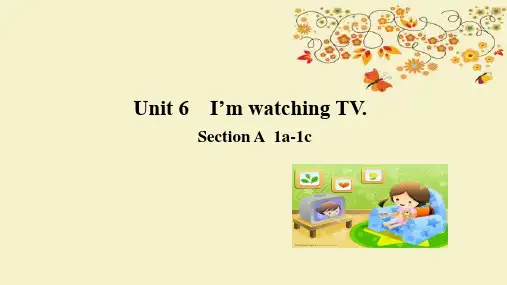
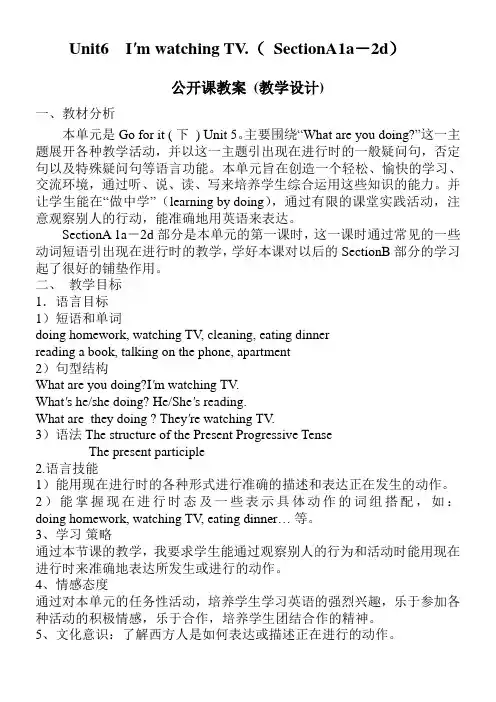
Unit6 I'm watching TV.(SectionA1a-2d)公开课教案(教学设计)一、教材分析本单元是Go for it ( 下 ) Unit 5。
主要围绕“What are you doing?”这一主题展开各种教学活动,并以这一主题引出现在进行时的一般疑问句,否定句以及特殊疑问句等语言功能。
本单元旨在创造一个轻松、愉快的学习、交流环境,通过听、说、读、写来培养学生综合运用这些知识的能力。
并让学生能在“做中学”(learning by doing),通过有限的课堂实践活动,注意观察别人的行动,能准确地用英语来表达。
SectionA 1a-2d部分是本单元的第一课时,这一课时通过常见的一些动词短语引出现在进行时的教学,学好本课对以后的SectionB部分的学习起了很好的铺垫作用。
二、教学目标1.语言目标1)短语和单词doing homework, watching TV, cleaning, eating dinnerreading a book, talking on the phone, apartment2)句型结构What are you doing?I'm watching TV.What's he/she doing? He/She's reading.What are they doing ? They're watching TV.3)语法The structure of the Present Progressive TenseThe present participle2.语言技能1)能用现在进行时的各种形式进行准确的描述和表达正在发生的动作。
2)能掌握现在进行时态及一些表示具体动作的词组搭配,如:doing homework, watching TV, eating dinner…等。
3、学习策略通过本节课的教学,我要求学生能通过观察别人的行为和活动时能用现在进行时来准确地表达所发生或进行的动作。
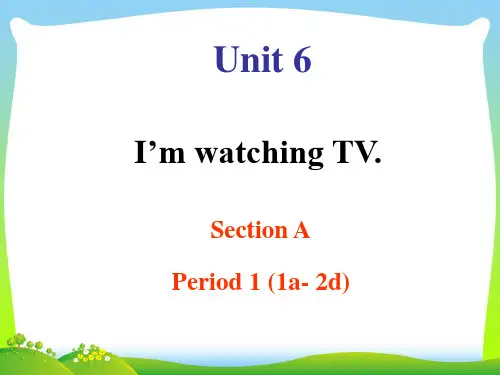
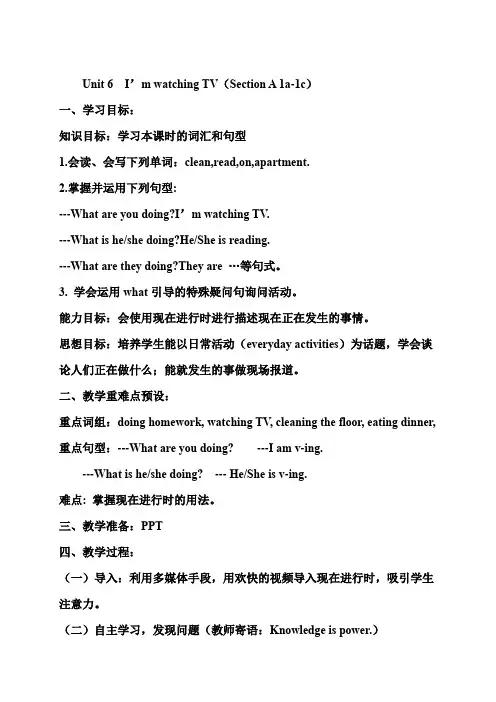
Unit 6 I’m watching TV(Section A 1a-1c)一、学习目标:知识目标:学习本课时的词汇和句型1.会读、会写下列单词:clean,read,on,apartment.2.掌握并运用下列句型:---What are you doing?I’m watching TV.---What is he/she doing?He/She is reading.---What are they doing?They are …等句式。
3. 学会运用what引导的特殊疑问句询问活动。
能力目标:会使用现在进行时进行描述现在正在发生的事情。
思想目标:培养学生能以日常活动(everyday activities)为话题,学会谈论人们正在做什么;能就发生的事做现场报道。
二、教学重难点预设:重点词组:doing homework, watching TV, cleaning the floor, eating dinner, 重点句型:---What are you doing? ---I am v-ing.---What is he/she doing? --- He/She is v-ing.难点: 掌握现在进行时的用法。
三、教学准备:PPT四、教学过程:(一)导入:利用多媒体手段,用欢快的视频导入现在进行时,吸引学生注意力。
(二)自主学习,发现问题(教师寄语:Knowledge is power.)学习任务一:掌握现在进行时(通过出示图片练习)eg.--- What are you doing? ---你在干什么?--- I’m watching TV. ---我在看电视。
用法:上面句子中使用的是现在进行时态。
表示现在或现阶段正在进行的动作。
其结构be(am,is ,are)+现在分词(v-ing),常与now,look,listen等指示性动作连用。
eg.(1)She/He ______ _______in the garden。
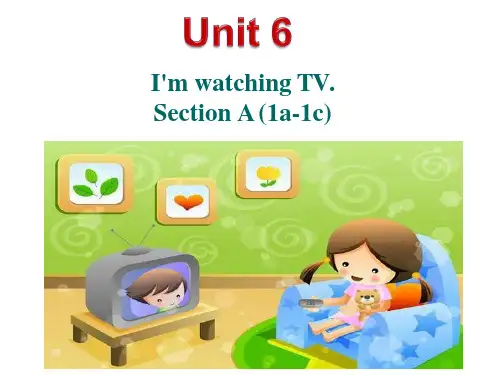
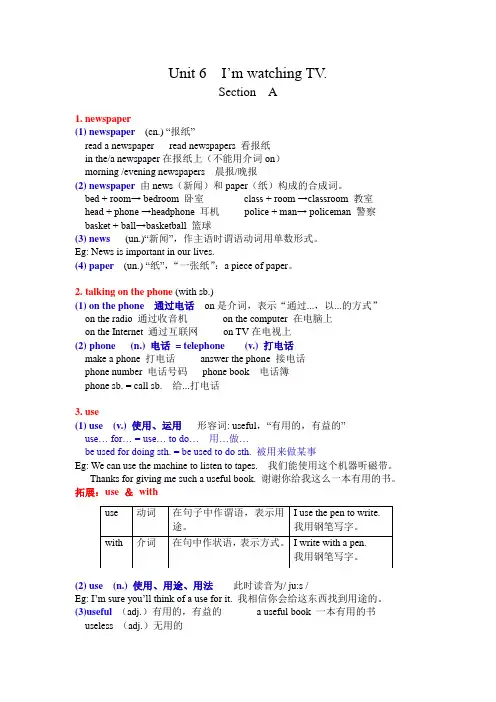
Unit 6 I’m watching TV.Section A1. newspaper(1) newspaper(cn.) “报纸”read a newspaper read newspapers 看报纸in the/a newspaper在报纸上(不能用介词on)morning /evening newspapers 晨报/晚报(2)newspaper 由news(新闻)和paper(纸)构成的合成词。
bed + room→ bedroom 卧室cla ss + room →classroom 教室head + phone →headphone 耳机police + man→ policeman 警察basket + ball→basketball 篮球(3) news (un.)“新闻”,作主语时谓语动词用单数形式。
Eg: News is important in our lives.(4) paper (un.) “纸”,“一张纸”:a piece of paper。
2.talking on the phone (with sb.)(1) on the phone 通过电话on是介词,表示“通过...,以...的方式”on the radio 通过收音机on the computer 在电脑上on the Internet 通过互联网on TV在电视上(2)phone (n.) 电话= telephone (v.) 打电话make a phone 打电话answer the phone 接电话phone number 电话号码phone book 电话簿phone sb. = call sb. 给...打电话3. use(1) use (v.) 使用、运用形容词: useful,“有用的,有益的”use… for… = use… to do… 用…做…be used for doing sth. = be used to do sth. 被用来做某事Eg: We can use the machine to listen to tapes. 我们能使用这个机器听磁带。
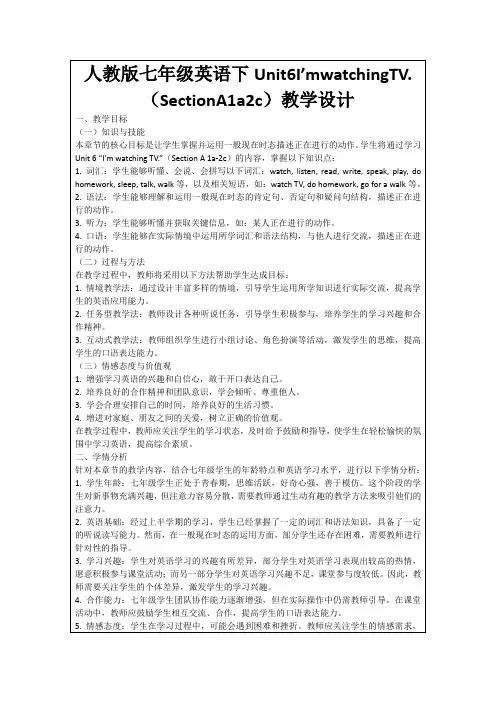
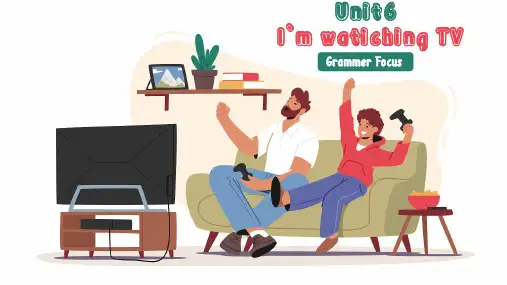
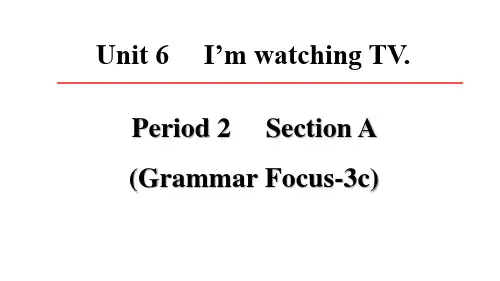
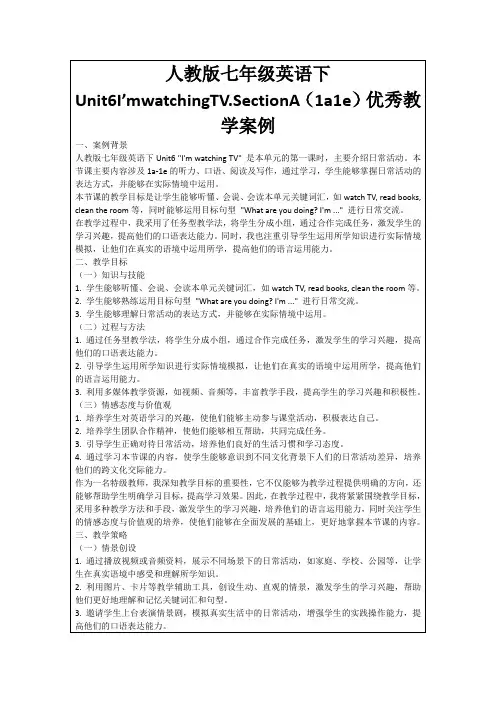
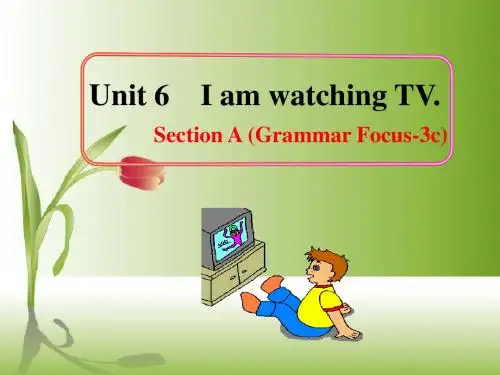
教师学科教案[ 20 – 20 学年度第__学期]任教学科:_____________任教年级:_____________任教老师:_____________xx市实验学校Unit6 I'm watching TV 教学设计一、教材分析本节课内容设计是围绕“everyday activities”这一个话题“谈论现在正在进行或发生的动作”,主要的教学内容是现在进行时,以“What are you doing?”这一主题引出现在进行时的一般疑问句,否定句以及特殊疑问句等语言功能。
这一话题贴近学生的日常生活,语言素材源于学生生活实际,因此有助于提高学生学习英语的兴趣。
我的教学设计理念:1、遵循任务型教学的教学理念,以学生为主体,以任务为中心,在运用语言完成任务的过程中来学习,体会和掌握语言。
2、自始至终贯穿了以交际为目的的原则(在做中学,在学中用)。
3、在教学过程中,关注学生的生活实际和生活体验,树立以学生为本的思想,提倡学生参与、体验、亲身实践、独立思考、合作探究,从而实现教学方式和学习方式。
二、教学目标1.知识目标1)短语和单词doing homework, watching TV, cleaning, eating dinner, read ing a book, talking on the phone, apartment2)句型结构What are you doing? I'm watching TV.What's he/she doing? He/She's reading.What are they doing ? They're watching TV.---Is he reading? ------Yes, he is./ No, he isn’t.3)语法The structure of the Present Progressive Tense The present participle2.能力目标1)能用现在进行时的各种形式进行准确的描述和表达正在发生的动作。
Unit 6 I’m watching TV.(讲义)Words and Expressionsnewspaper /'njuːz,peɪpə/ n. 报纸read a newspaper 看报纸use /juːz/ v.使用;运用soup /suːp/ n.汤make soup 做汤wash /wɒʃ/ v.洗movie /'muːvi/ n.电影go to the movies 看电影just /dʒʌst/ adv.只是;恰好eat out 出去吃饭house /haʊs/ n. 房子drink /drɪŋk/ v. 喝n.饮料tea /tiː/ n. 茶;茶叶drink tea 喝茶tomorrow /tə'mɒrəʊ/ adv. 在明天n. 明天;未来pool /puːl/ n. 游泳池;水池shop /ʃɒp/ v. 购物n. 商店supermarket /'suːpə(r),mɑː(r)kət/ n. 超市man /mæn/ n. 男人;人race /reɪs/ n. 竞赛host /həʊst/ n. 主人;东道主study /'stʌdi/ v. & n.学习;研究state /steɪt/ n.州the United States /ju'naɪtɪd 'steɪts/ (of America) (abbr. the US, the USA)美国;美利坚合众国American /ə'merɪkən/ adj. 美国的;美洲的n. 美国人;美洲人dragon /'drægən/ n. 龙Dragon Boat Festival 端午节any /'eni/ adj.任何的;任一的pron.任何;任一other /'ʌðə(r)/ adj.另外的;其他的pron.另外的人(或物)young /jʌŋ/ adj.幼小的;年轻的child /tʃaɪld/ n. 儿童(pl. children /'tʃɪldrən/)miss /mɪs/ v. 怀念;思念wish /wɪʃ/ v. 希望delicious /dɪ'lɪʃəs/ adj. 可口的;美味的still /stɪl/ adv.还;仍然living /'lɪvɪŋ/ room 客厅Steve /sti:v/ 史蒂夫(男名)Laura /'lɔ:rə/ 劳拉(女名)Role-playJenny: Hello? This is Jenny.Laura: Hi, Jenny. It’s Laura her e.Jenny: Oh, hi, Laura. What are you doing?Laura: Not much. I’m just washing my clothes. What about you?Jenny: I’m watching TV. Do you want to join me for dinner?My parents aren’t at home. We can eat out.Laura: Yeah. I’d love to.Jenny: Let’s meet at my home first. Come at half past six.Laura: OK. See you then.Grammar FocusWhat are you doing? I’m watching TV.What’s she doing?She’s washing her clothes.What are they doing? They’re listening to a CD.Are you doing your homework? Yes, I am./No, I’m not. I’m cleaningmy room.Is he reading a newspaper? Yes, he is./No, he isn’t. He’s playingbasketball.Are they using the computer? Yes, they are./No, they aren’t.The y’re exercising.练习一、用所给动词的适当形式填空1. Listen! A baby _____________(cry) in the room.2. Jim _____________ (fly) a kite now.3. Lucy _____________ (read) an interesting book these days.4. Be quiet! My grandpa _____________ (sleep).5. Mrs. Black _____________ (like) going shopping on weekends.6. Allan _____________ (get) up at 7:00 a.m. every day.二、句式变换7. They’re exercising. (变成一般疑问句)_______________________________________________________8. Is he reading a newspaper? (进行否定回答)_______________________________________________________9. Tom and Jerry are looking for you. (对划线部分提问)_______________________________________________________10. Tom and Jerry are looking for you. (对划线部分提问)_______________________________________________________ReadingRead the TV report and answer the questions.1. Why are Zhu Hui’s family watching boat races and making zongzi?2. Does Zhu Hui like his host family? What does he think about his home in China?Today’s story is about Zhu Hui, a student from Shenzhen. He’s now studying in the United States. He’s living with an American family in New York. Today is the Dragon Boat Festival. It’s 9:00 a.m. and Zhu Hui’s family are at home. His mother and aunt are making zongzi. His dad and uncle are watching the boat races on TV.Is Zhu Hui also watching the races and eating zongzi? Well, it’s 9:00 p.m. in New York, and it’s the night before the festival. But there isn’t a Dragon Boat Festival in the US, so it’s like any other nightfor Zhu Hui and his host family. The mother is reading a story to her young children. The father is watching a soccer game on TV. And what’s Zhu Hui doing? He’s talking on the phone to his cousin in Shenzhen. Zhu Hui misses his family and wishes to have his mom’s delicious z ongzi. Zhu Hui likes New York and his host family a lot, but there’s still “no place like home”.Exercises一、根据首字母填空或用单词的适当形式填空1. Many parents are strict(严格) with their c__________.2. The fish tastes(尝起来) very d__________.3. Gina is an A__________ girl. She is from America.4. Tom is very y__________, but he can look after himself well.5. Some __________ (man) are watching a football game on TV.6. You can take any __________(book) on the desk.7. Jim is taller(更高) than any other__________ (student) in the class.二、单选( )8.—Where is Kate?—She ______ TV in the living room.A. watchB. watchingC. is watchingD. is watch( )9.—Bob, would you like to play basketball with us?—______.A. No, I can’tB. I don’t want toC. Yes, pleaseD. Yes, I’d love to( )10.—What are you going to do tomorrow?—______. Do you have any ideas?A. SorryB. Nothing muchC. No problemD. Thank you( )11.She loves her daughter ______.A. veryB. a lot ofC. a lotD. lots of( )12.—Nancy, here is your new dress for your birthday.—Thank you, mom. It’s ______ the gift(礼物) I want.A. justB. stillC. onlyD. always( )13.It’s 11:00 p.m. now, but her mother is ______ doingsome ______.A. just; washingB. only; washingC. still; washD. still; washing( )14.Sometimes pandas are sent(被送往) to ______countries.A. the otherB. otherC. oneD. any( )15.There are two books on the desk. ______ is Tom’s and______ is Mary’s.A. One; oneB. One; otherC. One; the otherD. Some; the other( )16.I wish ______ around the world.A. travel(旅行)B. travelsC. to travelD. traveling( )17.How about______ us ______ the dinner?A. join; toB. join; forC. joining; atD. joining; for三、翻译18. 他们正在通过电话聊天。